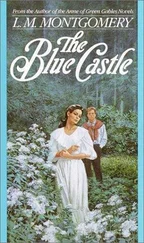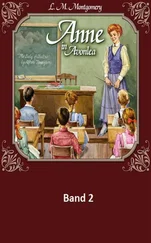"I suppose you'll not like candles very well, Emily, after being used to lamps at Wyther Grange," said Aunt Laura with a little sigh. It was one of the bitter, small things in Laura Murray's life that Elizabeth's tyranny extended to candles.
Emily looked around her thoughtfully. One candle sputtered and bobbed at her as if greeting her. One, with a long wick, glowed and smouldered like a sulky little demon. One had a tiny flame — a sly, meditative candle. One swayed with a queer fiery grace in the draught from the door. One burned with a steady upright flame like a faithful soul.
"I — don't know — Aunt Laura," she answered slowly. "You can be — friends — with candles. I believe I like the candles best after all.”
Aunt Elizabeth, coming in from the cook-house, heard her.
Something like pleasure gleamed in her gulf-blue eyes.
"You have some sense in you," she said.
"That's the second compliment she has paid me," thought Emily.
"I think Emily has grown taller since she went to Wyther Grange,” Aunt Laura said, looking at her rather wistfully.
Aunt Elizabeth, snuffing the candles, glanced sharply over her glasses.
"I can't see it," she said. "Her dress is just the same length on her.”
"I'm sure she has," persisted Laura.
Cousin Jimmy, to settle the dispute, measured Emily by the sitting- room door. She just touched the former mark.
"You see," said Aunt Elizabeth triumphantly, liking to be right even in this small matter.
"She looks — different," said Laura with a sigh.
Laura, after all, was right. Emily HAD grown, taller and older, in soul, if not in body. It was this change which Laura felt, as close and tender affection swiftly feels. The Emily who returned from Wyther Grange was not the Emily who had gone there. She was no longer wholly the child. Aunt Nancy's family histories over which she had pondered, her enduring anguish over the story of Ilse's mother, that terrible hour when she had lain cheek by jowl with death on the cliffs of the bay shore, her association with Dean Priest, all had combined to mature her intelligence and her emotions. When she went to the garret next morning and pulled out her precious little bundle of manuscripts to read them lovingly over she was amazed and rather grieved to find that they were not half so good as she had believed they were. Some of them were positively silly, she thought; she was ashamed of them — so ashamed that she smuggled them down to the cook-house stove and burned them, much to Aunt Elizabeth's annoyance when she came to prepare dinner and found the fire-box all choked up with charred paper.
Emily no longer wondered that Miss Brownell had made fun of them — though this did not mellow her bitterness of remembrance in regard to that lady in any degree. The rest she put back on the sofa shelf, including "The Child of the Sea," which still impressed her as fairly good, though not just the wonderful composition she had once deemed it. She felt that many passages could be re-written to their advantage. Then she immediately began writing a new poem, "On Returning Home After Weeks' Absence." As everything and everybody connected with New Moon had to be mentioned in this poem it promised to be quite long and to furnish agreeable occupation for spare minutes in many weeks to come. It was very good to be home again.
"There is no place just like dear New Moon," thought Emily.
One thing that marked her return — one of those little household "epochs" that make a keener impression on the memory and imagination than perhaps their real importance warrants — was the fact that she was given a room of her own. Aunt Elizabeth had found her unshared slumber too sweet a thing to be again surrendered. She decided that she could not put up any longer with a squirming bedfellow who asked unearthly questions at any hour of the night she took it into her head to do so.
So, after a long conference with Laura, it was settled that Emily was to have her mother's room — the "lookout" as it was called, though it was not really a lookout. But it occupied the place in New Moon, looking over the front door to the garden, that the real lookouts did in other Blair Water houses, so it went by that name.
It had been prepared for Emily's occupancy in her absence and when bedtime came on the first evening of her return Aunt Elizabeth curtly told her that henceforth she was to have her mother's room.
"All to myself?" exclaimed Emily.
"Yes. We will expect you to take care of it yourself and keep it very tidy.”
"It has never been slept in since the night before your mother — went away," said Aunt Laura, with a queer sound in her voice — a sound of which Aunt Elizabeth disapproved.
"Your mother," she said, looking coldly at Emily over the flame of the candle — an attitude that gave a rather gruesome effect to her aquiline features — "RAN away — flouted her family and broke her father's heart. She was a silly, ungrateful, disobedient girl. I hope YOU will never disgrace your family by such conduct.”
"Oh, Aunt Elizabeth," said Emily breathlessly, "when you hold the candle down like that it makes your face look just like a corpse!
Oh, it's so interesting.”
Aunt Elizabeth turned and led the way upstairs in grim silence.
There was no use in wasting perfectly good admonitions on a child like this.
Left alone in her lookout, lighted dimly by the one small candle, Emily gazed about her with keen and thrilling interest. She could not get into bed until she had explored every bit of it. The room was very old-fashioned, like all New Moon rooms. The walls were papered with a design of slender gilt diamonds enclosing golden stars and hung with worked woollen mottoes and pictures that had been "supplements" in the girlhood of her aunts. One of them, hanging over the head of the bed, represented two guardian angels.
In its day this had been much admired but Emily looked at it with distaste.
"I don't like feather wings on angels," she said decidedly.
"Angels should have rainbowy wings.”
On the floor was a pretty homespun carpet and round braided rugs.
There was a high black bedstead with carved posts, a fat feather- bed, and an Irish chain quilt, but, as Emily was glad to see, no curtains. A little table, with funny claw-feet and brass-knobbed drawers, stood by the window, which was curtained with muslin frills; one of the window-panes contorted the landscape funnily, making a hill where no hill was. Emily liked this — she couldn't have told why, but it was really because it gave the pane an individuality of its own. An oval mirror in a tarnished gilt frame hung above the table; Emily was delighted to find she could see herself in it — "all but my boots" — without craning or tipping it.
"And it doesn't twist my face or turn my complexion green," she thought happily. Two high-backed, black chairs with horsehair seats, a little washstand with a blue basin and pitcher, and a faded ottoman with woollen roses cross-stitched on it, completed the furnishing. On the little mantel were vases full of dried and coloured grasses and a fascinating pot-bellied bottle filled with West Indian shells. On either side were lovable little cupboards with leaded-glass doors like those in the sitting-room. Underneath was a small fireplace.
"I wonder if Aunt Elizabeth will ever let me have a little fire here," thought Emily.
The room was full of that indefinable charm found in all rooms where the pieces of furniture, whether old or new, are well acquainted with each other and the walls and floors are on good terms. Emily felt it all over her as she flitted about examining everything. This was her room — she loved it already — she felt perfectly at home.
"I belong here," she breathed happily.
She felt deliciously NEAR to her mother — as if Juliet Starr had suddenly become real to her. It thrilled her to think that her mother had probably crocheted the lace cover on the round pincushion on the table. And that flat, black jar of pot-pourri on the mantel — her mother must have compounded it. When Emily lifted the lid a faint spicy odour floated out. The souls of all the roses that had bloomed through many olden summers at New Moon seemed to be prisoned there in a sort of flower purgatory.
Читать дальше


